The global conveyor system market is projected to reach USD 11.9 billion by 2035, recording an absolute increase of USD 4.9 billion over the forecast period. The market is valued at USD 6.9 billion in 2025 and is set to rise at a CAGR of 5.5% during the assessment period. The overall market size is expected to grow by 1.7 times during the same period, supported by increasing demand for automated material handling solutions worldwide, driving demand for advanced conveyor technologies and increasing investments in industrial automation and warehouse modernization projects globally. However, high initial capital investment requirements and complex system integration challenges may pose challenges to market expansion.
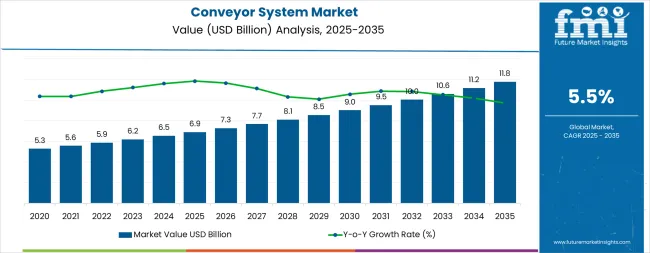
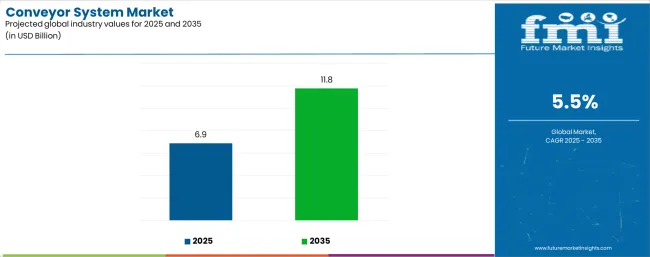
Between 2025 and 2030, the conveyor system market is projected to expand from USD 6.9 billion to USD 9.1 billion, resulting in a value increase of USD 2.2 billion, which represents 44.9% of the total forecast growth for the decade. This phase of development will be shaped by rising demand for warehouse automation and e-commerce fulfillment applications, product innovation in smart conveyor technologies and IoT integration systems, as well as expanding integration with Industry 4.0 initiatives and predictive maintenance capabilities. Companies are establishing competitive positions through investment in advanced automation technologies, modular conveyor solutions, and strategic market expansion across logistics, manufacturing, and distribution applications.
From 2030 to 2035, the market is forecast to grow from USD 9.1 billion to USD 11.9 billion, adding another USD 2.8 billion, which constitutes 57.1% of the overall ten-year expansion. This period is expected to be characterized by the expansion of specialized conveyor systems, including advanced automated formulations and integrated monitoring solutions tailored for specific industrial requirements, strategic collaborations between equipment manufacturers and end-user industries, and an enhanced focus on operational efficiency and energy optimization. The growing emphasis on smart manufacturing and automated logistics will drive demand for advanced, high-performance conveyor solutions across diverse industrial and commercial applications.
| Metric | Value |
|---|---|
| Market Value (2025) | USD 6.9 billion |
| Market Forecast Value (2035) | USD 11.9 billion |
| Forecast CAGR (2025 to 2035) | 5.5% |
The conveyor system market grows by enabling manufacturers and logistics providers to achieve superior operational efficiency and cost reduction across multiple industrial applications, ranging from small-scale production facilities to large-scale automated warehouses. Industrial operators face mounting pressure to improve productivity and reduce labor costs, with conveyor system solutions typically providing 30-50% improvement in material handling efficiency compared to manual systems, making advanced automation technology essential for competitive industrial operations. The manufacturing and logistics industry's need for maximum operational efficiency creates demand for advanced conveyor solutions that can minimize handling time, enhance throughput, and ensure consistent performance across diverse operational environments. Government initiatives promoting industrial automation and smart manufacturing drive adoption in packaging, automotive, and food processing applications, where operational performance has a direct impact on productivity and cost competitiveness. However, high upfront capital costs and the complexity of achieving optimal integration across different operational systems may limit adoption rates among cost-sensitive manufacturers and regions with limited technical infrastructure.
The market is segmented by product type, operation type, capacity type, application type, and region. By product type, the market is divided into belt conveyor, roller conveyor, pallet conveyor, overhead conveyor, tri-planar conveyor, crescent conveyor, skid conveyor, trailer conveyor, and others. Based on operation type, the market is categorized into manual, semi-automatic, and automatic systems. By capacity type, the market is classified into unit handling and bulk handling. By application type, the market is divided into packaging & warehouse distribution, textile & paper, construction & mining, automotive & transportation, consumer electronics, food & beverage, and chemical & pharmaceutical. Regionally, the market is divided into North America, Latin America, Western Europe, Eastern Europe, East Asia, South Asia Pacific, and Middle East & Africa.
The roller conveyor segment represents the fastest-growing force in the conveyor system market, projected to expand at a CAGR of 6.3% through 2035. This advanced product category encompasses formulations featuring superior load-bearing capabilities, including modular design characteristics and precision movement systems that enable exceptional material handling performance and enhanced operational reliability. The roller conveyor segment's rapid growth stems from its exceptional performance capabilities in automated warehouse applications, with systems capable of handling diverse product sizes while maintaining consistent speed and operational efficiency across demanding industrial conditions.
The belt conveyor segment maintains substantial market presence through established applications in manufacturing, mining, and food processing industries. These systems offer reliable performance for continuous material movement while providing sufficient versatility to meet basic operational requirements in traditional industrial applications.
Key technological advantages driving the roller conveyor segment include:
Automatic conveyor systems dominate the operation type category with projected growth at a CAGR of 6.1% through 2035, anticipated to command over 68.0% market share by 2035. This advanced operation category encompasses formulations featuring IoT integration capabilities, including smart sensor technology and predictive maintenance systems that enable superior operational control and enhanced performance monitoring. The automatic segment's market leadership reflects the critical importance of labor cost reduction, operational efficiency, and system reliability across industrial facilities, meeting automation requirements in modern manufacturing and logistics applications.
The semi-automatic segment maintains moderate market presence, serving facilities that require balanced automation with manual oversight for specialized handling applications. These systems offer reliable performance for medium-scale operations while providing sufficient flexibility to meet operational requirements in diverse industrial settings.
Key market dynamics supporting automatic operation growth include:
Unit handling systems demonstrate the strongest market performance in the conveyor system market, projected to expand at a CAGR of 6.2% through 2035. The unit handling segment's rapid growth reflects the critical importance of discrete item movement, automated sorting capabilities, and precise material control across e-commerce, automotive, and consumer electronics facilities, meeting operational requirements in high-throughput distribution and manufacturing applications.
Bulk handling systems maintain steady market presence through specialized applications in construction, mining, and heavy industrial sectors that require continuous material flow for large-volume operations. This segment benefits from established demand in traditional industrial applications that provides consistent capacity utilization and operational reliability for bulk material processing.
Key factors supporting unit handling advancement include:
Packaging & warehouse distribution applications demonstrate the fastest growth trajectory in the conveyor system market, projected to expand at a CAGR of 6.4% through 2035. The packaging & warehouse distribution segment's rapid expansion reflects the critical role of e-commerce fulfillment, automated sorting systems, and high-throughput distribution operations in driving conveyor system demand across logistics and retail supply chains.
Automotive & transportation applications show significant momentum through manufacturing line automation and assembly process optimization requirements. This segment benefits from continuous advancement in production automation that provides enhanced efficiency and quality control for complex manufacturing applications.
The food & beverage segment maintains steady presence through processing line applications, while consumer electronics applications provide specialized handling for delicate components. Chemical & pharmaceutical and construction & mining segments represent specialized industrial opportunities through material handling and safety compliance requirements.
Key dynamics supporting packaging & warehouse distribution growth include:
The market is driven by three concrete demand factors tied to operational efficiency and cost reduction outcomes. First, global e-commerce expansion and warehouse automation create increasing demand for high-performance conveyor systems, with online retail sales projected to exceed USD 7 trillion by 2030, requiring advanced automation solutions for maximum fulfillment efficiency. Second, modernization of manufacturing processes and Industry 4.0 adoption drive the implementation of intelligent conveyor technologies, with manufacturers seeking 30-50% improvement in material handling efficiency and operational cost reduction. Third, technological advancements in IoT integration and smart monitoring systems enable more effective and responsive conveyor solutions that reduce maintenance complexity while improving long-term performance and operational reliability.
Market restraints include high capital investment requirements that can impact project feasibility and return on investment calculations, particularly during periods of economic uncertainty or operational budget constraints affecting automation system adoption. System integration complexity poses another significant challenge, as achieving optimal performance across different operational environments and legacy systems demands specialized expertise and comprehensive planning systems, potentially causing implementation delays and increased project costs. Technical skills shortage in conveyor system operation and maintenance creates additional challenges for manufacturers, demanding ongoing investment in training capabilities and compliance with varying industrial safety standards.
Key trends indicate accelerated adoption in emerging markets, particularly China, India, and Brazil, where rapid industrialization and logistics infrastructure development drive comprehensive conveyor system deployment. Technology advancement trends toward AI integration with enhanced predictive analytics, energy-efficient motor systems, and modular design capabilities enable next-generation product development that addresses multiple operational requirements simultaneously. However, the market could face disruption if alternative material handling technologies or significant changes in manufacturing practices minimize reliance on traditional conveyor system solutions.
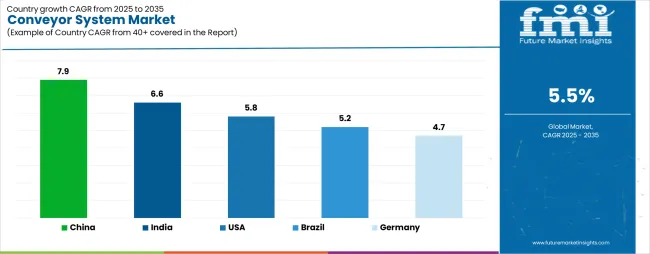
| Country | CAGR (2025 to 2035) |
|---|---|
| China | 7.9% |
| India | 6.6% |
| United States | 5.8% |
| Brazil | 5.2% |
| Germany | 4.7% |
The conveyor system market is gaining momentum worldwide, with China taking the lead thanks to massive food and beverage sector expansion and comprehensive manufacturing automation initiatives. Close behind, India benefits from rapid industrialization and growing packaging sector development, positioning itself as a strategic growth hub in the Asian region. The United States shows steady advancement, where airport expansion and air freight growth strengthen its role in the North American logistics and transportation development. Brazil is focusing on industrial modernization and infrastructure improvement, signaling an ambition to capitalize on growing opportunities in automated manufacturing technology markets. Meanwhile, Germany stands out for its advanced industrial automation and precision manufacturing capabilities, recording consistent progress in conveyor system optimization. Together, China and India anchor the global expansion story, while the rest build stability and diversity into the market's growth path.
The report covers an in-depth analysis of 40+ countries; 5 top-performing countries are highlighted below.
China demonstrates the strongest growth potential in the Conveyor System Market with a CAGR of 7.9% through 2035. The country's leadership position stems from massive food and beverage sector expansion, government-backed industrial modernization programs, and comprehensive manufacturing automation targets, driving the adoption of high-performance conveyor systems. Growth is concentrated in major industrial regions, including Guangdong, Jiangsu, Zhejiang, and Shandong, where manufacturers and processing facilities are implementing advanced conveyor solutions for enhanced operational performance and competitive advantages. Distribution channels through established industrial equipment suppliers and direct manufacturer relationships expand deployment across food processing plants, manufacturing facilities, and logistics centers. The country's manufacturing excellence strategy provides policy support for advanced automation technology development, including high-performance conveyor platform adoption.
Key market factors:
In Mumbai, Delhi, Bangalore, and Chennai, the adoption of conveyor systems is accelerating across packaging facilities and manufacturing centers, driven by industrialization targets and comprehensive automation initiatives. The market demonstrates strong growth momentum with a CAGR of 6.6% through 2035, linked to comprehensive packaging sector development and increasing focus on operational efficiency solutions. Indian manufacturers are implementing advanced conveyor systems and automated handling platforms to enhance production performance while meeting growing consumer demand in domestic and export markets. The country's industrial development programs create demand for high-performance conveyor solutions, while increasing emphasis on packaging automation drives adoption of advanced sorting technologies and integrated control systems.
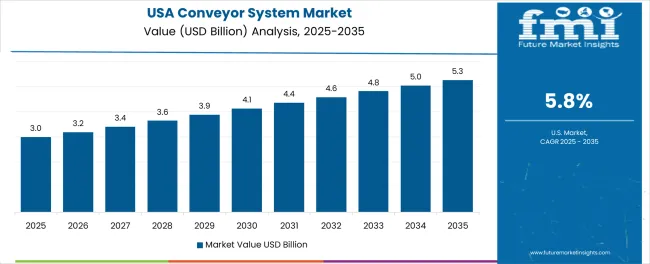
The United States' advanced logistics industry demonstrates sophisticated implementation of conveyor systems, with documented case studies showing efficiency improvements in airport applications through optimized baggage handling solutions. The country's transportation infrastructure in major airport hubs, including Atlanta, Los Angeles, Chicago, and New York, showcases integration of advanced conveyor technologies with existing logistics systems, leveraging expertise in automation engineering and material handling. American airports and logistics providers emphasize operational reliability and passenger service quality, creating demand for high-performance conveyor solutions that support efficiency initiatives and regulatory compliance requirements. The market maintains steady growth through focus on infrastructure modernization and operational excellence, with a CAGR of 5.8% through 2035.
Key development areas:
Brazil's market expansion is driven by diverse industrial applications, including conveyor automation in São Paulo and Rio de Janeiro regions, manufacturing development in Minas Gerais and Paraná, and comprehensive industrial modernization across multiple production areas. The country demonstrates promising growth potential with a CAGR of 5.2% through 2035, supported by industrial development programs and regional manufacturing initiatives. Brazilian manufacturers face implementation challenges related to technology transfer and infrastructure integration requirements, requiring system upgrade approaches and comprehensive support systems. However, growing operational efficiency targets and export competitiveness requirements create compelling business cases for conveyor system adoption, particularly in food processing and automotive sectors where automation performance has a direct impact on production competitiveness.
Market characteristics:
Germany's market leads in advanced industrial automation based on integration with precision manufacturing technologies and sophisticated production applications for enhanced operational characteristics. The country shows solid potential with a CAGR of 4.7% through 2035, driven by Industry 4.0 programs and manufacturing excellence initiatives across major industrial regions, including North Rhine-Westphalia, Bavaria, Baden-Württemberg, and Lower Saxony. German manufacturers are adopting advanced conveyor systems for production optimization and quality enhancement, particularly in regions with automotive manufacturing and precision engineering facilities requiring superior automation capabilities. Technology deployment channels through established automation companies and direct industrial relationships expand coverage across manufacturing facilities and logistics centers.
Leading market segments:
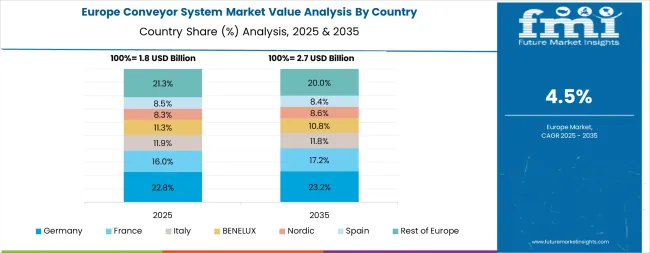
The conveyor system market in Europe is projected to grow from USD 1.7 billion in 2025 to USD 2.8 billion by 2035, registering a CAGR of 5.1% over the forecast period. Germany is expected to maintain its leadership position with a 32.4% market share in 2025, declining slightly to 31.8% by 2035, supported by its extensive manufacturing infrastructure and major industrial centers, including North Rhine-Westphalia, Bavaria, and Baden-Württemberg automation hubs.
The United Kingdom follows with a 18.2% share in 2025, projected to reach 18.7% by 2035, driven by comprehensive logistics modernization programs and advanced warehouse automation initiatives implementing conveyor technologies. France holds a 15.6% share in 2025, expected to maintain 15.3% by 2035 through ongoing industrial development and manufacturing excellence programs. Italy commands a 13.1% share, while Spain accounts for 9.8% in 2025. The Rest of Europe region is anticipated to gain momentum, expanding its collective share from 10.9% to 11.6% by 2035, attributed to increasing conveyor system adoption in Nordic countries and emerging Eastern European manufacturing markets implementing advanced automation programs.
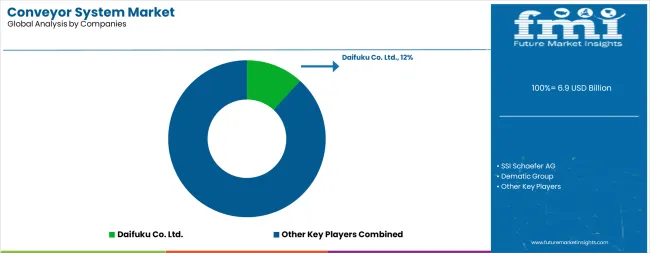
The conveyor system market features approximately 25-30 meaningful players with moderate concentration, where the top three companies control roughly 30-35% of global market share through established technology platforms and extensive industrial relationships. Competition centers on technological innovation, system reliability, and comprehensive automation capabilities rather than price competition alone.
Market leaders include Daifuku Co. Ltd., SSI Schaefer AG, and Dematic Group, which maintain competitive advantages through comprehensive material handling solution portfolios, global service networks, and deep expertise in the automation and logistics sectors, creating high switching costs for customers. These companies leverage research and development capabilities and ongoing technical support relationships to defend market positions while expanding into adjacent smart manufacturing and warehouse automation applications.
Challengers encompass Vanderlande Industries and Honeywell Intelligrated, which compete through specialized conveyor solutions and strong regional presence in key industrial markets. Technology specialists, including Swisslog Holding AG, Murata Machinery Ltd., and Interroll Group, focus on specific applications or vertical markets, offering differentiated capabilities in automated systems, precision handling, and modular conveyor technologies.
Regional players and emerging automation providers create competitive pressure through innovative solutions and rapid customization capabilities, particularly in high-growth markets including China, India, and Brazil, where local presence provides advantages in regulatory compliance and system integration. Market dynamics favor companies that combine advanced conveyor technologies with comprehensive service offerings that address the complete automation lifecycle from system design through ongoing performance optimization.
Conveyor systems represent advanced automation technologies that enable manufacturers and logistics providers to achieve 30-50% improvement in material handling efficiency compared to manual systems, delivering superior operational performance and cost reduction with enhanced throughput capabilities in demanding industrial applications. With the market projected to grow from USD 6.9 billion in 2025 to USD 11.9 billion by 2035 at a 5.5% CAGR, these automation systems offer compelling advantages - enhanced operational efficiency, customizable handling configurations, and intelligent monitoring integration - making them essential for manufacturing facilities, distribution centers, and logistics operations seeking alternatives to manual material handling systems that compromise productivity through slower throughput and higher labor costs. Scaling market adoption and technological advancement requires coordinated action across industrial automation standards, material handling regulations development, equipment manufacturers, industrial operators, and automation technology investment capital.
| Items | Values |
|---|---|
| Quantitative Units | USD 6.9 billion |
| Product Type | Belt Conveyor, Roller Conveyor, Pallet Conveyor, Overhead Conveyor, Tri-Planar Conveyor, Crescent Conveyor, Skid Conveyor, Trailer Conveyor, Others |
| Operation Type | Manual, Semi-Automatic, Automatic |
| Capacity Type | Unit Handling, Bulk Handling |
| Application Type | Packaging & Warehouse Distribution, Textile & Paper, Construction & Mining, Automotive & Transportation, Consumer Electronics, Food & Beverage, Chemical & Pharmaceutical |
| Regions Covered | North America, Latin America, Western Europe, Eastern Europe, East Asia, South Asia Pacific, Middle East & Africa |
| Country Covered | China, India, United States, Brazil, Germany, and 40+ countries |
| Key Companies Profiled | Daifuku Co. Ltd., SSI Schaefer AG, Dematic Group, Vanderlande Industries, Honeywell Intelligrated, Swisslog Holding AG, Murata Machinery Ltd., Interroll Group |
| Additional Attributes | Dollar sales by product type, operation type, capacity type, and application categories, regional adoption trends across East Asia, South Asia Pacific, and North America, competitive landscape with automation providers and system integrators, operational requirements and specifications, integration with Industry 4.0 initiatives and smart manufacturing systems, innovations in conveyor technology and control systems, and development of specialized configurations with efficiency and reliability capabilities. |
The global conveyor system market is estimated to be valued at USD 6.9 billion in 2025.
The market size for the conveyor system market is projected to reach USD 11.8 billion by 2035.
The conveyor system market is expected to grow at a 5.5% CAGR between 2025 and 2035.
The key product types in conveyor system market are belt conveyor, roller conveyor, pallet conveyor, overhead conveyor, tri-planar conveyor, crescent conveyor, skid conveyor, trailer conveyor and others.
In terms of operation type, automatic segment to command 55.0% share in the conveyor system market in 2025.






Full Research Suite comprises of:
Market outlook & trends analysis
Interviews & case studies
Strategic recommendations
Vendor profiles & capabilities analysis
5-year forecasts
8 regions and 60+ country-level data splits
Market segment data splits
12 months of continuous data updates
DELIVERED AS:
PDF EXCEL ONLINE
UV Conveyor Systems Market
ASEAN Conveyor System Market Growth - Trends & Forecast 2024 to 2034
Smart Conveyor Packaging Systems Market Analysis Size and Share Forecast Outlook 2025 to 2035
Gravity Conveyor System Market Size and Share Market Forecast and Outlook 2025 to 2035
Modular Conveyor System Market
Intelligent Conveyor System Market
Electric Motors For Conveyor System Market
Intelligent Garment Hanging Conveyor System Market Size and Share Forecast Outlook 2025 to 2035
Conveyor Belt Market Size and Share Forecast Outlook 2025 to 2035
Conveyor Drives Market Analysis - Size, Share, and Forecast Outlook 2025 to 2035
Conveyor Dishwasher Market Size and Share Forecast Outlook 2025 to 2035
Conveyor Maintenance Industry Analysis in Australia - Size, Share, and Forecast Outlook 2025 to 2035
Conveyor Dryer Market Growth, Trends & Forecast 2025 to 2035
Conveyors and Belt Loaders Market Growth - Trends & Forecast 2025 to 2035
Conveyor Ovens & Impinger Ovens Market
Conveyor Belt Materials Market
Pack Conveyors Market Size and Share Forecast Outlook 2025 to 2035
Screw Conveyor Market Size and Share Forecast Outlook 2025 to 2035
Chain Conveyors Market Size and Share Forecast Outlook 2025 to 2035
Key Players & Market Share in Screw Conveyor Industry

Thank you!
You will receive an email from our Business Development Manager. Please be sure to check your SPAM/JUNK folder too.
Chat With
MaRIA